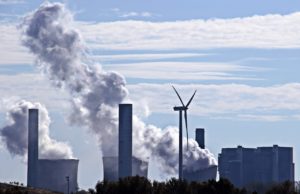By David Sánchez and Frida Kieninger
 The clock is ticking for climate change. And politicians know, at least some of them. The new Spanish government is radically changing climate policies in the country. While the previous one imposed a tax on solar energy and removed incentives for renewables, the new Ministry for Ecological Transition has published a draft for a Climate Change legislation that created a huge controversy.
The clock is ticking for climate change. And politicians know, at least some of them. The new Spanish government is radically changing climate policies in the country. While the previous one imposed a tax on solar energy and removed incentives for renewables, the new Ministry for Ecological Transition has published a draft for a Climate Change legislation that created a huge controversy.
According to the draft that answers a historical demand from environmental groups like Friends of the Earth Spain, at least 20% of the national budget will be earmarked for climate action. There are a lot of good measures in the project, including:
- A 100% renewable energy electricity system by 2050 (70% by 2030).
- A ban on fracking (but not on imports of fracked gas).
- No more fossil fuel exploration licenses (onshore and offshore). The existing ones will phase out by 2040.
- A ban on subsides or economic incentives for fossil fuels and a review of the existing ones to eliminate them.
- Installation of 3,000 new megawatts of renewable energy per year.
This all sounds good, but there is still a lot to improve. The draft sets 2040 as the date to ban sale of gasoline and diesel cars, when other European countries have been more ambitious. Furthermore, while Spain is turning into a pig factory farm nation and the meat industry is the fourth biggest in the country (after the auto, oil and electricity industries), there is no mention in the draft about emissions coming from industrial agriculture.
Beyond these critics, there is a huge uncertainty whether this draft will one day become law or not. The current socialist government has a weak parliamentary position, so a lot of negotiations will be necessary.
Meanwhile, just a few days ahead of the start of climate talks in coal-loving Poland, the COP 24 in Katowice, the Commission published its 2050 climate strategy. Out of the eight scenarios, just a few are supposed to reach net zero emissions, but all rely on technologies to capture and storage carbon as well as on gas and so-called “renewable gases”, or biogas.
While Spain sent a clear political signal, the European Commission still lacks of ambition. And the clock is ticking…


